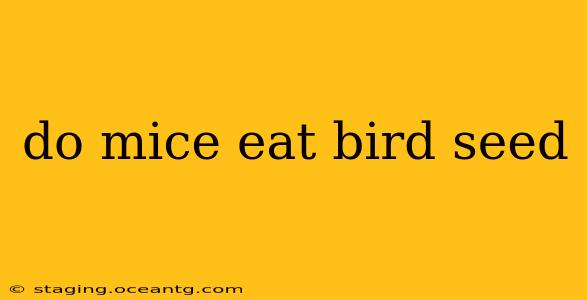Do Mice Eat Bird Seed? A Comprehensive Guide
Yes, mice are opportunistic feeders and will readily consume birdseed. Bird feeders, often overflowing with tempting seeds, represent an easy and readily available food source for mice. This presents a problem for bird enthusiasts and homeowners alike, as mice can quickly become a nuisance, contaminating feeders and potentially spreading disease.
This article will delve deeper into this topic, exploring various aspects of mice and their consumption of birdseed, answering common questions, and offering solutions for managing this issue.
What types of birdseed do mice prefer?
Mice are not picky eaters. They'll consume a wide variety of birdseed, but they tend to show a preference for seeds that are high in fat and oil content, such as sunflower seeds, safflower seeds, and cracked corn. These offer a richer energy source compared to smaller seeds like millet.
How do mice get to birdseed?
Mice are incredibly agile and can access birdseed in a multitude of ways. They can climb, squeeze through surprisingly small gaps, and even gnaw through materials to reach a food source. A poorly maintained or unsecured bird feeder provides an open invitation.
Can birdseed attract other rodents besides mice?
Absolutely. Birdseed is attractive to a variety of rodents, including rats, voles, and squirrels. A consistent supply of food will draw in more than just mice, creating a larger pest control problem.
What are the risks of having mice eat birdseed?
Beyond the simple annoyance of a rodent infestation, there are several risks associated with mice consuming birdseed near bird feeders:
- Disease transmission: Mice can carry diseases that are transmissible to both birds and humans. Their droppings can contaminate birdseed, potentially causing illness.
- Contamination of birdseed: Mice droppings and urine contaminate the birdseed, making it unsuitable for birds to consume.
- Competition for resources: A large mouse population will compete with birds for the available birdseed, reducing the food supply for the intended beneficiaries of the feeder.
- Damage to property: Mice can gnaw on wood, wires, and other materials around the bird feeder, potentially causing damage to your property.
How can I prevent mice from eating birdseed?
Preventing mice from accessing birdseed requires a multi-pronged approach:
- Choose the right feeder: Opt for feeders with baffles or cages that prevent mice from climbing up to reach the seed. Metal feeders are generally more resistant to chewing than plastic ones.
- Regularly clean feeders: Remove any spilled seed and clean the feeder regularly to prevent the accumulation of food scraps and droppings.
- Secure the feeder: Mount the feeder securely to a pole or branch, making it difficult for mice to access. Consider using a wire cage around the base of the feeder to prevent climbing.
- Store birdseed properly: Store birdseed in airtight containers in a dry, rodent-proof location. Do not leave large quantities of birdseed outdoors.
- Consider using rodent repellent: Some commercially available rodent repellents might help deter mice from the area. Always follow the manufacturer's instructions.
Are there any birdseed types that mice dislike?
While mice will eat most types of birdseed, some evidence suggests that they may be less attracted to certain types, such as niger seeds (thistle seeds). However, there's no birdseed that will completely deter them. The best approach is prevention through secure feeders and proper storage.
By understanding the behavior of mice and taking appropriate precautions, you can minimize the risks associated with mice consuming birdseed and ensure that your bird feeder remains a safe and effective source of food for your feathered friends. Remember, prevention is key!
